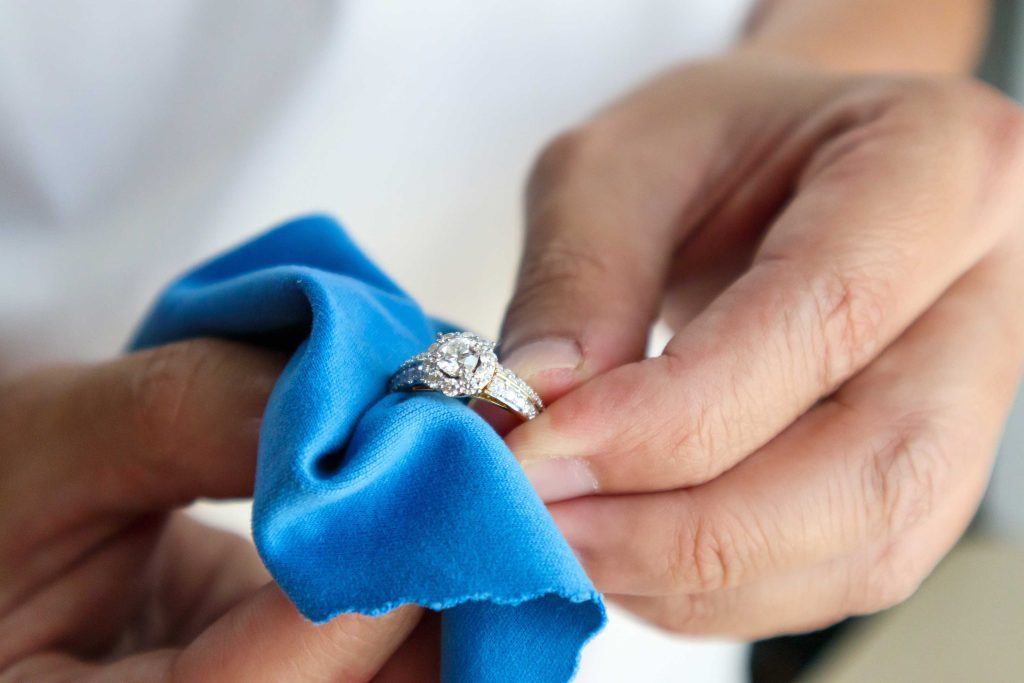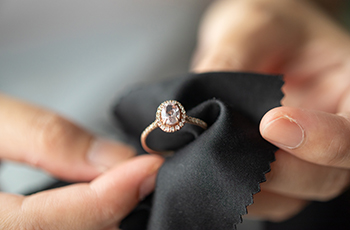Using a range of polishing tools and equipment, jewellers will thoroughly clean pieces they’ve created in-house before selling them. As the final step in the jewellery-making process, cleaning and polishing ensures the finished piece in question is free from any dirt, dust and oils that may cause tarnish.
Regular cleaning is recommended, with a professional clean once a year, but how often does the average consumer actually clean their jewellery?
We conducted a survey and found that only 8% of the UK population cleans their jewellery every week. Surprisingly, 22% of consumers never clean their jewellery and when asked why, 40% responded stating that they didn’t think it needed cleaning.
The right jewellery cleaner can ensure your piece is free from tarnish and any damage that can be caused by daily dirt, dust and sweat. Using our own expert opinion, we’ve put together a simple guide on cleaning jewellery, covering the best tools and methods for how to clean silver jewellery, gold jewellery and jewellery fitted with stones.
Jewellery Cleaning Myths
So, what is the best way to clean jewellery? Before we explore what you should be doing, let’s first tackle what you shouldn’t do.
The use of household items and cleaning products to clean jewellery is surprisingly popular. Our survey found that 32% of people use ordinary soap and water to clean jewellery pieces, but interestingly 13% use vinegar and alcohol, and 10% use Coca-Cola. With this in mind, we investigate the myths surrounding cleaning jewellery.
Can You Clean Jewellery With Coke, Vinegar or Alcohol?
So, does Coke clean jewellery?
Products like clear alcohol, Coke, and vinegar can remove grime. The acid in Coke is powerful enough to strip rust, however, if left long enough it can even strip the paint and colour in jewellery. The same also applies to vinegar.
Clear hard alcohol, such as gin or vodka, is also known to dissolve dirt molecules on jewellery when left to soak for a couple of hours.
Though these may seem like quick fixes, using household items to clean your jewellery may potentially cause irreparable damage. Harsh chemicals and strong acids can harm metals and gemstones over time and make them weak. There is even the possibility that regular use of household items to clean jewellery may cause skin conditions.


What Is The Best Way To Clean Jewellery?
The team at Cooksongold know the best way to clean jewellery to keep your pieces in the best condition.
The right tools are essential. Whether you have a diamond ring, a gold bracelet or a pearl necklace, jewellery made from high-quality precious metals and genuine precious stones is an investment that requires care.
Jewellery cleaning may not be a priority, but if your piece is a gift from a loved one or was an investment, then cleaning it regularly with the right tools will ensure the quality will last.
Below is a list of methods and tools for cleaning your jewellery that will keep it lasting for generations.
Cleaning Cloths and Solution
Inexpensive and easy to use, cleaning cloths are an effortless way to restore shine and remove dirt from your jewellery. Some cleaning cloths come impregnated with cleaning solution, such as the Hagerty Jewel Cloth, whereas others don’t need solution to work, like the Ultra Polishing Pads.
Cleaning solutions and polishing waxes are destined to remove dirt and tarnish and protect precious metals. Cleaning solutions and dips are quick and easy to use. Wax polishes require additional time and effort to apply correctly. Both work well to restore lost lustre and shine.
If you’re wondering how to clean silver jewellery, then using a specific silver solution will help to remove oxidation, perspiration and daily dirt from your items, as well as restore the lustre of the silver.
Ultrasonic Cleaners
For professional jewellery makers, or those with a large collection of items, an ultrasonic cleaner is ideal. Deemed the most accurate and efficient way of cleaning jewellery, an ultrasonic cleaner works by transmitting high-frequency sound waves through liquid to clean the surface. They remove dirt from hard-to-reach areas without damaging precious or non-precious metals or stones.
Scratch Brushes
If your jewellery items are suffering from rust or stubborn dirt, then a set of scratch brushes will restore the original quality. Steel bristles can remove rust, oxide and dirt, even on harder metals. And a fiberglass bristle can polish, creating a satin finish, without scratching the metal.
That’s the end of our guide on how to clean jewellery. For more expert tips on jewellery polishing and cleaning, or if you fancy making your own creations, why not check out our range of jewellery tools and supplies?


Cooksongold

